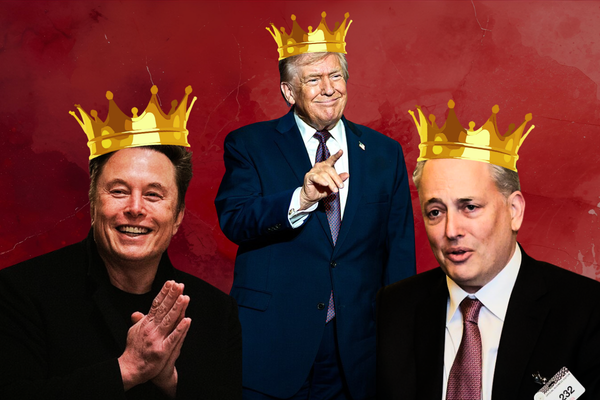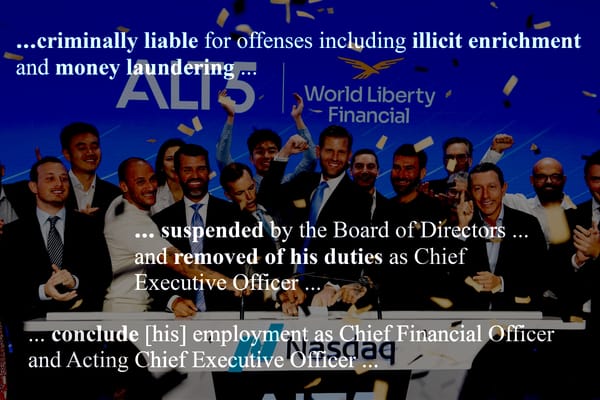Issue 90 – Crime szn bro
The Trump administration cracks down on software to limit surveillance of crypto transactions, while celebrating a “deregulatory blitz” tailored for its billionaire benefactors


A jury’s partial conviction of Tornado Cash developer Roman Storm illustrates the Trump administration’s selective approach to cryptocurrency policy: slash regulations and end enforcement actions against benefactors, while cracking down on the type of privacy software that was once a fundamental component of the original cypherpunk ideology — long since abandoned by much of the crypto industry. A White House cryptocurrency working group recommendation to expand the Patriot Act to digital asset transactions suggests this is not just a prosecutorial hangover from the Biden administration, but an ongoing priority. Meanwhile, Trump’s SEC is running “Project Crypto”, described as a lucrative “deregulation blitz” for the industry.
In the courts
A jury found Tornado Cash developer Roman Storm guilty on one of the three charges against him. Though the jury deadlocked on the other two charges — money laundering conspiracy and conspiracy to evade sanctions — they found him guilty of conspiracy to operate an unlicensed money transmitting business. This charge was the one I recently wrote “twisted the Tornado Cash prosecutors into a pretzel” after they followed guidance from Deputy Attorney General Todd Blanche to drop a portion of the charge:
Now they’re left trying to argue that Tornado Cash should have been doing a whole bunch of compliance activities, while simultaneously acknowledging that they can’t prosecute Storm for failing to register as a business that would require such compliance.
The good news for Storm is that this charge carries a comparatively light maximum sentence of up to five years in prison; the other two charges have maximum sentences of twenty years. Storm’s attorney said he plans to appeal his conviction, telling reporters it has “serious legal issues”. I certainly don’t disagree, and I’ll be watching the appeal closely.1
It’s uncertain if prosecutors will attempt to retry the remaining two charges. They may not, given that this case has been politically unpopular among more ideological segments of Trump’s crypto base. However, the recent White House cryptocurrency working group report recommending expanding the Patriot Act to digital asset transactions may suggest that the administration intends to continue — or increase — crackdowns on crypto mixers and other privacy software.2

Though this may be controversial among the ideologues, it’s not necessarily unpopular among Trump’s wealthiest crypto backers. Andreessen Horowitz endorsed extending the Patriot Act to digital assets in July.3
As the jury began deliberating in Storm’s trial, Samourai Wallet developers reached a plea deal in a similar case involving crypto mixing software [I56, 57, 83, 84]. The two defendants, Keonne Rodriguez and Bill Lonergan Hill, pleaded guilty to one count each of conspiracy to operate an unlicensed money transmitting business in exchange for prosecutors dropping the more severe money laundering conspiracy charge.4 They will also forfeit a combined $238 million.5 I think Rodriguez and Hill had worse chances if they went to trial than Storm, though they were energetically preparing a defense based in part on arguments that prosecutors had improperly withheld communications by FinCEN employees who had opined that Samourai was not a money services business [I83, 84]. I think Samourai Wallet’s more centralized structure would have made it easier for prosecutors to argue the defendants actively operated the service, unlike Storm who could more convincingly claim he merely wrote code for Tornado Cash without maintaining ongoing control. While some observers are angry that Rodriguez and Hill didn’t take up a principled fight against what they view as Justice Department overreach around privacy-preserving software, I can’t fault someone for choosing a guaranteed maximum sentence of five years in prison over the risk of a sentence up to four times as long.
Terra/Luna founder Do Kwon has also reached a plea deal, pleading to two of nine original charges in connection to the $40 billiona collapse of his stablecoin scheme in 2022 [I73]. He faces a maximum sentence of five years on a wire fraud charge and up to twenty years on a fraud conspiracy charge, which could run consecutively. If Kwon accepts responsibility and doesn’t commit new crimes, the government will push for no more than a twelve year sentence (though the judge isn’t required to accept the government’s suggestion). Kwon has also agreed to forfeit some properties and up to $19 million, and pay restitution.6 He also still faces charges in South Korea.
The Second Circuit voted 2–1 to overturn the May 2023 fraud and money laundering convictions of Nathan Chastain, a former OpenSea product manager accused of insider trading NFTs based on knowledge that they would soon be featured on OpenSea’s front page [W3IGG]. Chastain had been sentenced to three months of home confinement and 200 hours of community service, and ordered to pay around $76,000 in fines and forfeiture. The appeals court determined that the lower court had erred in instructing the jury in a way that suggested they could convict Chastain for merely acting unethically, even if they didn’t believe he had stolen any property interest from the company.7 Chastain argued in his appeal that “not all confidential information is property,” adding that his company had not lost any money, and had actually profited from his trades because of the fees they take on all NFT sales.8
Indian police arrested Rahul Agarwal, a CoinDCX software engineer, whose credentials were used last month to hack the company for $44 million [W3IGG]. Agarwal claims he had no direct involvement in the theft, and local news reports suggest his work laptop was compromised when he unknowingly downloaded malware disguised as part of a freelance job offer.9
Eli Regalado, the online pastor who claimed the Lord told him to start a cryptocurrency scheme [I49], faces 40 criminal theft, fraud, and racketeering charges, along with his wife. They raised almost $3.4 million for their “God-inspired” cryptocurrency, INDXcoin, but spent at least $1.3 million on personal expenditures, including “a home remodel that the Lord told us to do”.10 They were also sued by the Colorado Division of Securities in January 2024.
In Congress
The high is wearing off from the passage of the GENIUS stablecoin bill [I89], and the cryptocurrency industry is anxious about the prospects of a market structure bill becoming law before midterm campaigns capture Congressmembers’ attention, possibly threatening Republicans’ trifecta in 2026. Blockchain Association CEO Summer Mersinger (a former CFTC Commissioner under Biden) told Semafor, “It’s so wonderful to have a pro-crypto administration, but that is something that could be overturned with the new administration. What we want is a permanent framework.” Banking regulation professor Todd Phillips explained, “They have to get a bill across the finish line soon, or it’s not going to happen. And since Senate Banking and Senate Ag don’t seem to be talking right now, Senate Banking and House Financial Services are on different pages, and the 2026 election is right around the corner, my money is on it not happening.”11
In regulators
The New York State Department of Financial Services and stablecoin issuer Paxos have agreed to a $48.5 million settlement after the regulator accused Paxos of insufficient anti-money laundering controls and due diligence failures in its former partnership with Binance to issue the BUSD stablecoin. The NYDFS alleged that Paxos didn’t have a sufficient monitoring program to detect “significant illicit activity occurring at or through Binance”, including transactions from US customers accessing the exchange despite prohibitions, and transactions with sanctioned entities. The NYDFS also claimed that, outside of the Binance partnership, Paxos’ insufficient compliance programs allowed customers to open multiple accounts and engage in potentially illicit coordinated activity, failed to detect “obvious patterns of money laundering”, and poorly defined when to open investigations based on law enforcement requests. $26.5 million of the settlement is a penalty paid to the state, and the remaining $22 million will go to compliance improvements.12
Only days after the settlement, Paxos joined Ripple, Circle, and other cryptocurrency companies in applying for a national trust bank charter, which would put the firm under federal OCC supervision and more closely integrate it into the traditional financial system.13 Crypto-friendly regulators are being installed at various federal agencies, including former blockchain executive and newly confirmed Comptroller of the Currency John Gould [I88]. Paxos and other crypto firms, in seeking these charters, may be hoping to reduce their exposure to state regulators — particularly in places like New York — that have continued to police crypto company abuses, and instead operate primarily under more permissive federal oversight.
CFTC
Trump’s nominee for CFTC chair, a former CFTC commissioner and current Head of Policy for Andreessen Horowitz’s crypto arm Brian Quintenz, is facing some opposition from Congress and, surprisingly enough, some in the crypto industry. His confirmation has dragged on longer than most of Trump’s appointees, and several scheduled confirmation hearing votes were canceled — most recently at the White House’s request, with no explanation.
Quintenz is a shareholder and board member of the CFTC-regulated prediction market Kalshi, which has been heavily engaged with the CFTC over the past few years as it battled a lawsuit from the agency and sought new regulatory approvals [I66, 68, 76, 83]. On July 26, gambling consultant Dustin Gouker published excerpts of emails obtained via Freedom of Information Act requests, suggesting Quintenz and intermediaries were seeking confidential information that could present conflicts of interest given his role at Kalshi.14 Representative Dina Titus (D-NV), co-chair of the Congressional Gaming Caucus, subsequently called for a CFTC investigation into Quintenz, writing:15
Since Mr. Quintenz’s nomination in February, the CFTC has taken several actions related to prediction markets that have impacted Kalshi and its competitors. This includes settling lawsuits with Kalshi, approving new prediction market platforms, and closing relevant investigations. ... I ask the CFTC to release all communications between the agency and Mr. Quintenz related to commission matters on prediction markets. This includes communications about Mr. Quintenz and agency decision-making, including attempts to direct individuals to communicate with Mr. Quintenz through his private email. I also ask for the disclosure of communications with Mr. Kevin Webb, Mr. Quintenz’s expected Chief of Staff, about the nominee’s involvement with agency decision-making before he has been confirmed.
The Winklevoss twins, who run the Gemini cryptocurrency exchange and are now part of Trump’s inner circle of crypto donors, previously celebrated Quintenz’s nomination, with Cameron Winklevoss writing in February that Quintenz was “exactly the leader the CFTC needs.”16 Now, though, the twins are privately pressuring Trump to rescind his nomination, claiming Quintenz isn’t sufficiently Trump-aligned and won’t do enough to overhaul the CFTC to their specifications.17 The Winklevoss twins recently wrote to the CFTC Inspector General, months after Gemini reached a $5 million settlement with the agency, insisting that their company was “unreasonably and unfairly” targeted and demanding a “transformation” at the agency [I86].
A key issue, according to Politico, is that Quintenz suggested during a June confirmation hearing that the CFTC’s budget should increase if it takes on greater responsibilities in crypto regulation and enforcement.17 The CFTC has long been the crypto industry’s desired regulator, largely because it is smaller and more budget-constrained compared to the more aggressive SEC. While some, including Quintenz, argue that an expanded mandate should come with additional funding, the Winklevoss twins seem to hope the CFTC will be forced to do more with less, stretching the agency thinner and limiting its ability to energetically oversee and enforce crypto regulations.
The Winklevosses also criticized Quintenz for remarks from his previous CFTC tenure, including those suggesting smart contract developers could be liable if they could reasonably foresee that their software might be used to violate CFTC regulations, and others the Winklevosses view as insufficiently opposed to central bank digital currencies. They also agreed that Quintenz’s FOIA-ed emails “raise serious questions”.18
SEC
SEC Chairman Paul Atkinsb has announced “Project Crypto”, described by crypto media outlet DL News as a “deregulation blitz”.19 In a July 31 speech, Atkins described the initiative as “the SEC’s north star in aiding President Trump in his historic efforts to make America the ‘crypto capital of the world.’” He criticized longstanding securities laws as not “mak[ing] sense in the twenty-first century — let alone for on-chain markets”, asserting that “Despite what the SEC has said in the past, most crypto assets are not securities.” He also addressed the “real-world assets” trend [I88], where crypto firms aim to put a blockchain veneer on traditional securities — something other experts have warned could provide a gaping loophole in securities regulation. “[F]irms — from household names on Wall Street to unicorn tech companies in Silicon Valley — are lined up at our doors with requests to tokenise”, he explained, revealing that he instructed SEC staff to provide exemptions from regulations “where appropriate to assure that Americans are not left behind.”20
On August 5, the SEC issued a staff statement on “certain liquid staking activities”, describing a process allowing crypto holders to lock tokens in proof-of-stake networks to earn rewards (“staking”), but also receive a transferable representation of those staked tokens — often in the form of a derivative token — that can be traded, loaned, or otherwise used in defi protocols while the original tokens remain staked. These activities, the SEC advises, do not fall within SEC oversight.21 As she has in the past when the SEC issued other statements opining that various crypto activities are exempt from securities regulations [I85], Commissioner Crenshaw disagreed and issued her own statement, writing: “[I]nstead of clarifying the legal landscape, today’s statement, like other recent staff statements before it, only muddies the waters.”22
In the White House
The White House’s cryptocurrency working group, headed by David Sacks, released its promised report outlining recommendations for cryptocurrency regulation.2 The New York Times characterized the report as a blueprint to “implement policies that would advance the crypto industry’s agenda.”23
President Trump signed two new crypto-related executive orders. One accuses banks of politically motivated denial of services targeting “persons participating in activities and causes commonly associated with conservatism and the political right following the events that occurred at or near the United States Capitol on January 6, 2021”.24 Though the order doesn’t mention crypto, it has been celebrated by the crypto industry, which hopes it will address their “debanking” complaints. The order instructs federal banking regulators to remove the use of reputation risk as a factor in evaluating banking applications, something Federal Reserve Chair Jerome Powell had already promised in February.

Another is the planned executive order I mentioned last issue [I89], which promises to “democratize access” to “alternative assets” for 401(k) investors, directing consultations and reconsideration of guidance around including assets like private equity, real estate, and managed funds investing in digital assets in 401(k) offerings.25 Though many in the private equity world were excited at the potential infusion of cash from a new slice of investors, some balked at being categorized alongside crypto, which they viewed as highly speculative and rife with high-profile conflicts of interest.26
Bo Hines, former director of the President’s Council of Advisers on Digital Assets, abruptly announced his departure to return to the private sector. He will be replaced by his deputy, Patrick Witt. Like Hines, Witt’s qualifications also seem to involve playing college football and failing to be elected to Congress [I72] — though Witt spent time during the first Trump administration at the Office of Personnel Management, and then on Trump’s legal team fighting to overturn the results of the 2020 election.2728 Witt ran for office in 2022, with an aborted bid for the Republican nomination for Georgia’s 10th Congressional district and then an unsuccessful campaign to become the state’s Insurance and Safety Fire Commissioner. He lost the Republican primary for the latter, despite a Trump endorsement and promises to “keep your insurance from going woke”.27 In 2012, Witt was the subject of a New York Times story after he claimed to have skipped a Rhodes scholarship interview to play in a football game against Harvard, drawing obsequious nationwide profiles for his “apparent choice of team fealty over individual honor”. According to the Times, he chose this story rather than admitting that the Rhodes Trust had rescinded his scholarship candidacy after learning he had been accused by an ex-girlfriend of sexual assault.29 In 2014, he penned an op-ed for the Boston Globe opposing a new sexual harassment policy at Harvard, where he was in his first year of law school. In the op-ed, he claimed the NFL passed him over because of the accusation, adding that he both did not know what the accusation was and that he was innocent of it.c Witt’s Globe op-ed was titled “A sexual harassment policy that nearly ruined my life”.30 I guess he couldn’t have known then that, a decade later, such an accusation would be practically a resume requirement for the Trump administration.
Former Binance CEO Changpeng Zhao is still hard at work trying to secure a pardon for his 2023 money laundering conviction [I79, 83]. Zhao has personally spent $30,000 in the last few months on lobbying the president for “executive relief”, hiring BakerHostetler partner Teresa Goody Guillén (a former SEC lawyer from 2009–2011).31 Since March 24, Binance has also spent another $190,000 on Goody Guillén’s and other BakerHostetler lobbyists’ services to lobby Congress, the SEC, and the CFTC on “financial services policy issues relating to digital assets and cryptocurrency”.32 Goody Guillén simultaneously represents the Trump family’s World Liberty Financial project; she wrote the brief May retort from the company in response to Senator Blumenthal’s questions about Trump’s conflicts of interest [I83, 84].33
Trump business interests
Trump’s World Liberty Financial has announced it will be jumping aboard the crypto treasury bandwagon — because apparently the Trumps need to be involved with a fourth.d Using the Nasdaq-listed ALT5 Sigma Corporation, they will set up a crypto treasury with World Liberty’s own WLFI token. ALT5 plans to sell 200,000 new shares to fund the purchase of $1.5 billion worth of WLFI tokens, and add Eric Trump and World Liberty Financial executives Zach Witkoff and Zak Folkman to its board. All three have a financial interest in World Liberty Financial, presenting a blatant conflict of interest in their roles on the ALT5 board. The deal provides the first valuation for the WLFI token, which cannot yet be resold, though the project just voted to allow secondary trading [I88]. Trump personally holds 15.75 billion WLFI tokens, suggesting a paper valuation of $3.15 billion.34
The glut of crypto treasury companies is continuing to draw concern [I86, 84]. Eric Benoist of the investment bank Natixis CIB told the Financial Times, “My main problem with this strategy is that I don’t really understand where it ends. The company is in a loop where it has to continually feed that loop with additional purchases, go back to the market to purchase more — this cycle has to continue to justify the premium.” Hmm, why is that description ringing a bell? And why is that bell a klaxon?
Even crypto executives are getting uneasy. The FT quotes a crypto market maker CEO who told them, “You’re injecting a huge amount of risk into a system that, in the end, has almost nothing backing it except the continued appreciation of the asset.”

A report by blockchain firm Galaxy Digital warns of structural risks from the proliferation of such companies: “When hundreds of firms adopt the same one-directional trade (raise equity, buy crypto, repeat), it can become structurally fragile. A downturn in any of these three variables (investor sentiment, crypto prices, and capital markets liquidity) can start to unravel the rest.” Though the report describes the risk as “largely theoretical” (“for now”), it compares the potential spiral to the 1920s investment trust crash:35
Trusts traded at premiums to NAV, issued shares, and used the proceeds to buy more assets. When sentiment turned, those same mechanics amplified the downside. Collapsing premiums choked off access to capital while leverage magnified losses on falling assets. These cascading failures were an accelerant of the 1929 crash and subsequent Great Depression. [Digital Asset Treasury Companies] may be more transparent and better regulated than 1920s trusts, but the mechanics of mNAV-driven capital formation are eerily similar.
DWF Labs and Falcon Finance
World Liberty Financial has invested $10 million into Falcon Finance, creator of a “synthetic stablecoin” that recently depegged for several days after questions about potentially dubious collateral.36 (“Synthetic stablecoin” is the new term for “algorithmic stablecoin”, a phrase that fell out of favor after algostablecoins like Terra collapsed in multi-billion dollar fiascoes in 2022.)
Falcon shares a co-founder with the Dubai-based DWF Labs, which purchased $25 million of WLFI tokens in April and announced plans to open a New York office [I82]. “Our visibility in the U.S. has been increased because of this deal,” said managing partner Andrei Grachev, explaining the decision to open the office. “We would like to have direct dialogue with the policymakers.”37 World Liberty Financial co-founder Zak Folkman described DWF Labs as a “partner” that would “help accelerate” World Liberty.38
DWF’s Grachev previously ran the Moscow branch of the Huobi (now HTX) crypto exchange, and has close ties to the Russian state-owned bank VEB. Before Huobi, Grachev was convicted of fraud in Russia after he set up a fake shipping firm; while on probation, he was accused of participating in multiple cryptocurrency scams.3940 Grachev resigned as Huobi Russia’s CEO in 2019 amid further scam allegations. DWF Labs, only a few years old, has itself been embroiled in scandal after scandal, including pump-and-dump allegations, wash trading allegations [I58], and accusations that a firm partner drugged a female job applicant and tried to coerce her into his hotel room with promises of “inside information”. (DWF Labs denied the market manipulation allegations, and fired the partner accused of assault.)414239
In April, a week before DWF Labs’ WLFI purchase and office announcement, Grachev tweeted “it is a crime szn bro”, responding to a reply to another tweet where he wrote he was “enjoying [the] market nowadays, it is freaking volatile, real Wild Wild West”.43
Justin Sun
With his recent announcement of another $100 million purchase of $TRUMP memecoins [I88], Justin Sun’s total contributions to Trump-connected cryptocurrency projects has come to around $213 million. On July 24, Sun’s “Sundog” memecoin, themed around a smirking corgi, posted a meme on Twitter depicting the mascot controlling puppet strings attached to the White House, with the caption “You never truly know who’s pulling the strings... 🤫”
![Tweet screenshot: SunDog @SUNDOG_TRX You never truly know who’s pulling the strings… 🤫 [AI-generated image of a corgi dog with a collar depicting the Tron logo, paws raised above the White House, with strings attached to the paws like a marionette] 2:30 AM Jul 24, 2025](https://www.citationneeded.news/content/images/2025/08/Screenshot-2025-08-13-at-12.00.02---AM.png)
In elections and political influence
David Bailey, who runs Bitcoin Magazine, the annual Bitcoin Conference, and the Nakamoto bitcoin treasury firm, is a staunch Trump supporter and one of the president’s trusted crypto advisers [I63, 84]. Now he’s considering adding another venture: a bitcoin super PAC. “I’m thinking about raising a $100m-$200m PAC (anchored by Nakamoto) to advance Bitcoin priorities,”44 he tweeted. Replying to a commenter who asked, “what will be the objectives of this platform?”, Bailey wrote: “Send Bitcoin to $10m/btc”.45 When someone wrote “Always been Pay to Play”, Bailey replied: “We pay in the hardest money ever invented.”46
Bailey has floated the idea of a PAC before. In late June, as Congress was working on the “Big Beautiful Bill” and considering an amendment to exempt bitcoin transactions below $600 from capital gains tax, Bailey tweeted: “I’m thinking about raising a $100m+ Fairshake PAC equivalent focused on Bitcoin issues. Anyone who votes against the bitcoin tax amendment tomorrow we seek revenge on in the midterms.”47 (The amendment didn’t make it into the final bill.)
Meanwhile, Coinbase and other firms have been ramping up their political influence and lobbying in the United Kingdom. Earlier this month, Coinbase ran an ad featuring a sarcastic musical theater-style song called “Everything is Fine”, portraying the country as destroyed by inflation, strikes, and unemployment, ending with the text “If everything’s fine, don’t change anything.” Nigel Farage, leader of the Reform UK political party, quickly embraced the ad, writing “Even Coinbase says Britain is broken.” Coinbase CEO Brian Armstrong falsely claimed that the ad had been banned by UK advertising regulators, writing “If you can’t say it, then there must be a kernel of truth in it.” He seemed to delight in the supposed ban and the subsequent publicity, writing: “We welcome the attacks and any other attempts to censor this message, as it just helps it spread.”48 However, Decrypt later confirmed that the Advertising Standards Authority had not banned the ad, though the UK ad approval NGO Clearcast (which does not have the authority to ban ads outright) did opine in a statement to the outlet that the ad “presented cryptocurrency as a potential solution to economic challenges, without sufficient evidence for this claim or any warnings about the potential volatility and risks.”49
Around the same time as the ad, the Financial Times ran an op-ed by former chancellor and current Coinbase advisory council member George Osborne, titled: “Britain missed the first crypto wave. We can’t miss the second”. “We have allowed ourselves to be left behind,” he wrote, criticizing restrictions on crypto ETF purchases, accreditation tests for bitcoin purchases, and UK banks’ limits on transfers to crypto exchanges. The op-ed wasn’t well-received by FT readers in the comments, who tend toward the crypto-skeptical, and who wrote things like “This is honestly embarrassing, it’s just lobbying for Coinbase, making it obvious which direction the ‘advice’ is flowing in his Advisory Council role.”50
The Web3 is Going Just Great recap
There were seven entries between July 24 and August 13, averaging 0.3 entries per day. $20.23 million was added to the grift counter.
Monero faces 51% attack
[link]
Monero, a privacy-focused blockchain network, is undergoing an ongoing attempted 51% attack. In a successful 51% attack, where a single entity controls 51% or more of a blockchain's mining power, the entity could reorganize blocks, attempt to double-spend, or censor transactions.
A company called Qubic has been waging the 51% attack, claiming to be “stress testing” Monero. Many in the Monero community have condemned Qubic for what they see as a malicious attack on the network, and a marketing stunt.
Though Qubic claims it achieved 51% of the Monero hashrate, these claims have been disputed. However, they do appear to be very close if not there already, and there have been multiple chain reorganizations — including a 6-block reorg — suggesting Qubic has established significant control over Monero mining. It remains to be seen how long Qubic can maintain such control, estimated to cost the firm around $75 million per day. Qubic has said it hopes to take over Monero mining entirely, but that it has so far stopped short of doing so out of concern that the Monero price would be negatively impacted.
Memecoin promoters allegedly responsible for throwing sex toys at WNBA games
[link]
A group of crypto enthusiasts promoting a memecoin claimed responsibility for a series of incidents where neon green sex toys were thrown onto professional women’s basketball courts during at least six WNBA games since July 29. They described the stunts as coordinated “pranks” to raise the coin’s profile, in an ecosystem where memecoin prices are often heavily tied to virality.
The incidents have been widely condemned as both dangerous and misogynistic by players, coaches, and the league, which has implemented penalties including immediate ejection, a minimum one-year ban, and possible felony charges for offenders.
"It's super disrespectful," said Chicago Sky player Elizabeth Williams. "The sexualization of women is what's used to hold women down, and this is no different," stated Minnesota Lynx coach Cheryl Reeve. "The intent is to sexualize and demean the women players because they are women," wrote Glamour.
"This is empowering to every fucking crypto community to start thinking outside the box. Get creative and fucking do something that makes people actually laugh," said a member of the memecoin community, cheering the incidents for their virality and the subsequent impact on the coin price. The meme was amplified by Donald Trump Jr., who posted to Instagram a photoshopped image of President Trump dropping a green sex toy off the White House roof onto a group of women playing basketball below.
Everything else
- Traders lose $1 million to malicious “trading bot” software [link]
- Credix team vanishes after $4.5 million exploit [link]
- Crypto lender Abra pauses withdrawals for international customers [link]
- $731,000 stolen in SuperRare hack [link]
- Customers of WOO X lose $14 million after exchange compromise [link]
Worth a read
Public Citizen’s new report outlines the extent to which the Trump administration has ended enforcement actions and investigations against corporations — many of which are technology companies that have spent over $1 billion on lobbying, campaign contributions, and payments to Trump businesses. Nearly half of the dropped or paused enforcement actions were against cryptocurrency companies.
A single disclosure document from the pro-Trump MAGA Inc. political action committee has provided a horrifying illustration of the scale of the bribery happening in the White House right now. The article describes the seven- and eight-figure contributions from “crypto and other interests”. The disclosure report is eye-popping, showing that roughly half of the contributions (both in terms of quantity and monetary value) came from crypto or crypto-related people and companies. More than $85 million was contributed to the Trump PAC by such entities in the first half of 2025.
Professor Hilary J. Allen wrote a blog post about what she calls “the innovation bait-and-switch”, where venture-backed tech companies “develop a business model that centers a particular technology. Tell some stories about how that technology will solve a legitimate problem (preferably using the words ‘democratize’ and ‘disrupt’). Bend or break some laws with that business model, and profit from not complying with the law. Get away with bending or breaking the law, and with harming people along the way, because lawmakers and regulators are too timid to stop ‘innovation.’ Get big enough that you can convince lawmakers and regulators to change the law so that you never have to comply with it and those who are harmed have no recourse. Bonus points if the law is changed in a way that guarantees you a monopoly or oligopoly position.” This happens in sectors ranging from ridesharing to fintech, and it’s certainly a very familiar story to anyone who knows the crypto sector.
In the news
I spoke to David D. Kirkpatrick for his mammoth project to estimate how much Trump has profited from the presidency. His estimate comes to around $3.4 billion all told, including crypto and traditional business ventures. Around $2.4 billion of it comes from crypto deals.
Thomas B. Edsall quoted me fairly extensively in a recent op-ed about Trump’s egregious crypto corruption.
I also went on a bunch of podcasts:
- This Week in Tech, “Well Played Astronomer”
- Coinage, “Crypto Critic Molly White Slams Tornado Cash Trial”
- The Rip Current, “99% of Crypto is a Scam (with Molly White)”
- The Rage, “Everything You Need to Know About The Trial Against Roman Storm”
- Better Offline, “Building A Newspaper Out of the Internet with Molly White”
That's all for now, folks. Until next time,
– Molly White
Have information? Send tips (no PR) to molly0xfff.07 on Signal or molly@mollywhite.net (PGP).
I have disclosures for my work and writing pertaining to cryptocurrencies.
References
“Mistrial in Tornado Cash developer Roman Storm's money laundering case”, Business Insider. ↩
“Strengthening American Leadership in Digital Financial Technology”, President’s Working Group on Digital Asset Markets. ↩
“Re: Response to the Senate Banking Committee Digital Asset Market Structure Request for Information” from Andreessen Horowitz, July 31, 2025. ↩
July 30, 2025 minute entries in US v. Rodriguez. ↩
Consent preliminary order of forfeiture/money judgment filed on July 30, 2025. Document #142 in US v. Rodriguez. ↩
“Terraform’s Do Kwon Pleads Guilty to Conspiracy, Wire Fraud in UST Blow-up”, CoinDesk. ↩
Opinion filed on July 31, 2025. Document #59 in US v. Chastain (2nd Cir.). ↩
Brief filed on January 16, 2024. Document #3 in US v. Chastain (2nd Cir.). ↩
“Hackers used fake job offer to target CoinDCX employee, steal $44 million: report”, The Block. ↩
Indictment published on July 22, 2025. The People of the State of Colorado v. Eligio Regalado. ↩
“Trump gave crypto everything he could. The industry still wants more”, Semafor. ↩
“Superintendent Adrienne A. Harris Secures $48.5 Million Settlement with Paxos Trust Company for Anti-Money Laundering Deficiencies and Diligence Failures with Relation to Binance Partnership”, press release by the New York State Department of Financial Services. ↩
“Exclusive: Paxos joins spate of crypto companies applying for US trust bank licenses”, Reuters. ↩
“What An FOI Request Tells Us About The CFTC Nominee And Potential Conflicts Of Interest”, The Closing Line. ↩
Letter by Representative Dina Titus to Acting CFTC Chairwoman Caroline Pham. ↩
“Winklevoss brothers pressed Trump to dump pick for top Wall Street regulator”, Politico. ↩
“Gemini's Tyler Winklevoss Says Trump CFTC Pick Quintenz Has 'Disqualifying' Views”, CoinDesk. ↩
“SEC Chair announces ‘Project Crypto’ deregulation blitz”, DL News. ↩
“American Leadership in the Digital Finance Revolution”, speech by SEC Chairman Paul S. Atkins. ↩
“Statement on Certain Liquid Staking Activities”, US Securities and Exchange Commission. ↩
“Response to Staff Statement on Certain Liquid Staking Activities: Caveat Liquid Staker”, US Securities and Exchange Commission. ↩
“White House Urges ‘Pro-Innovation Mind-Set’ to Crypto in New Report”, The New York Times. ↩
“Guaranteeing Fair Banking For All Americans”, executive order published August 7, 2025. ↩
“Democratizing Access to Alternative Assets for 401(K) Investors”, executive order published August 7, 2025. ↩
“Private Equity Is Torn Over Being Lumped In With Crypto in 401(k) Order”, Bloomberg. ↩
“Who Is Patrick Witt, President Trump's Next Senior Adviser on Crypto?”, CoinDesk. ↩
“Trump feud with Georgia governor reaches into campaign for insurance commissioner”, Roll Call. ↩
“At Yale, the Collapse of a Rhodes Scholar Candidacy”, The New York Times. ↩
“A sexual harassment policy that nearly ruined my life”, Boston Globe. ↩
Lobbying report filed on July 21, 2025. ↩
Registrations and quarterly activity by Lobbyist Teresa Goody Guillen, US Senate Lobbying Disclosure. ↩
“Flattery, Lobbyists and a Business Deal: Crypto’s Richest Man Campaigns for a Pardon”, The New York Times. ↩
“World Liberty Financial token valued at $0.20 in Trump crypto project’s ALT5 treasury deal”, DLNews. ↩
“The Rise of Digital Asset Treasury Companies (DATCOs)”, Galaxy Digital. ↩
“DWF Labs-backed USDf depegs as red flags raised over quality of backing”, Protos. ↩
“Secret Deals, Foreign Investments, Presidential Policy Changes: The Rise of Trump’s Crypto Firm”, The New York Times. ↩
“DWF Labs Announces U.S. Expansion with New Office as Part of Growth Strategy, Unveils $25M Strategic World Liberty Financial (WLFI) Token Purchase”, press release by DWF Labs. ↩
“Trump Family’s Crypto Venture Nets $25 Million Investment From Firm Suspected of Fraud”, Rolling Stone. ↩
“The Shady Financial Past of a Major Trump Crypto Investor”, The Nation. ↩
“DWF Labs partner allegedly caught trying to drug job applicant”, Protos. ↩
“Binance Pledged to Thwart Suspicious Trading—Until It Involved a Lamborghini-Loving High Roller”, The Wall Street Journal. ↩
“That Supposedly 'Banned' Coinbase Ad Is Playing on UK TV Channel's YouTube”, Decrypt. ↩
“UK is being ‘left behind’ on crypto, says George Osborne”, Financial Times. ↩
“The Quarterback’s Tangled Saga”, The New York Times. ↩
“Donald Trump Jr. sells large Thumzup stake as firm targets BTC, ETH, SOL, XRP, and crypto mining”, The Block. ↩
Footnotes
Loss estimates for the Terra fiasco vary dramatically, but prosecutors have settled on around $40 billion as their estimate. CoinDesk claims it’s more like $60 billion. ↩
At the time of his nomination, Atkins served on the board of the blockchain advocacy and lobbying group Digital Chamber of Commerce and the blockchain company Securitize, and held up to $6 million in crypto-related assets [I80]. ↩
Witt also claimed in the Globe op-ed that the Times had retracted their story; I could find no evidence of a retraction, and the story remains online. The Times’ public editor, Arthur S. Brisbane, did publish a secondary article questioning the use of anonymous sources in the original story, but wrote, “I’m not in a position to dispute The Times’s finding, although I think the story was handicapped by not having Mr. Witt’s version of the timeline.” (Brisbane also noted that Witt had not responded to multiple requests for comment, and that the authors of the original story stated they had “made a tremendous effort to try to get him to talk”).51 ↩
Eric and Donald Trump Jr. are part owners of the American Bitcoin mining and treasury company, and Eric is a co-founder and Chief Strategy Officer; the Trump majority-owned Trump Media & Technology Group just acquired a $2 billion bitcoin treasury; Eric Trump is on the board of the Metaplanet treasury company. Donald Trump Jr. also owned a large stake in the Thumzup Media treasury company, though he seems to have recently sold it.52 ↩





